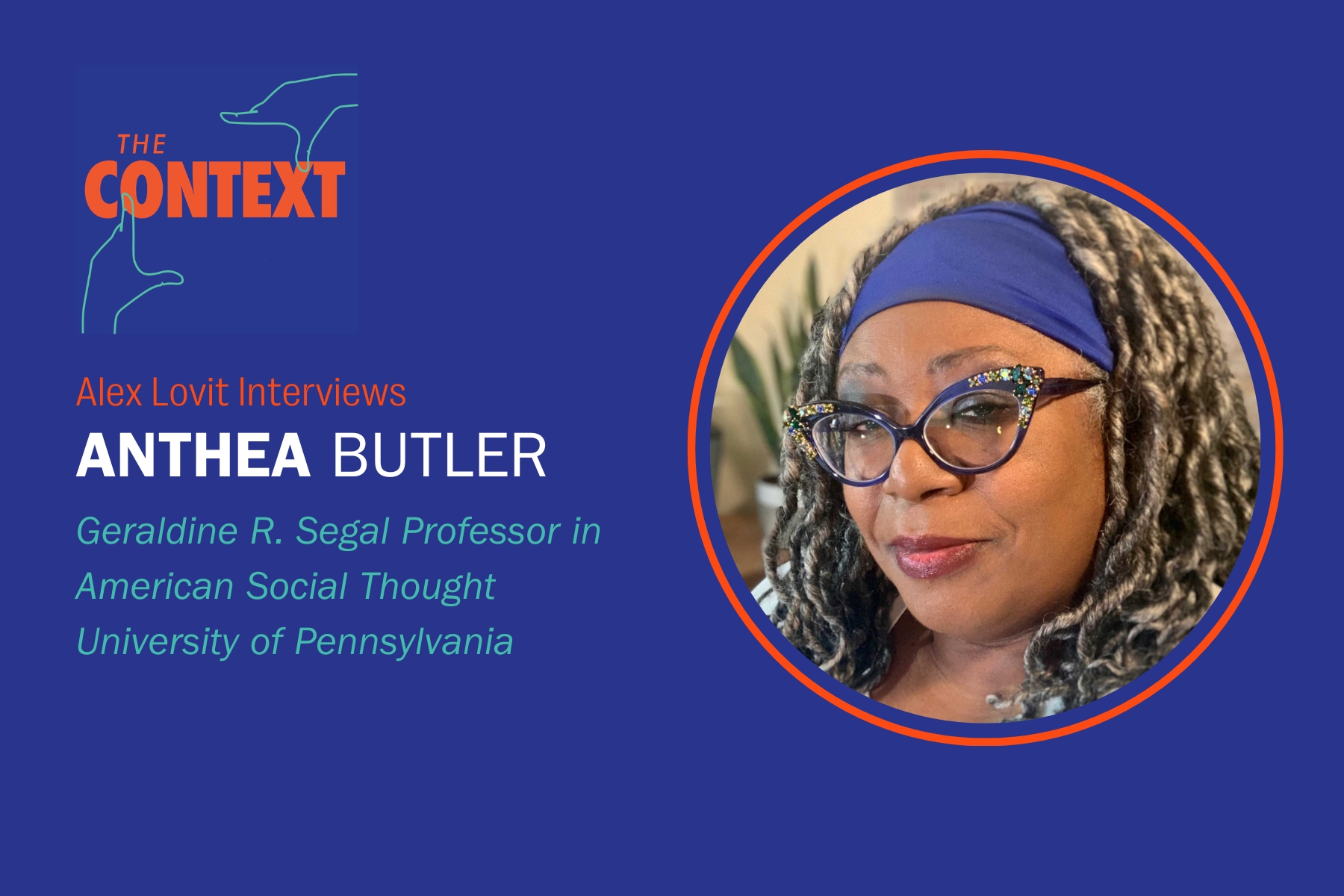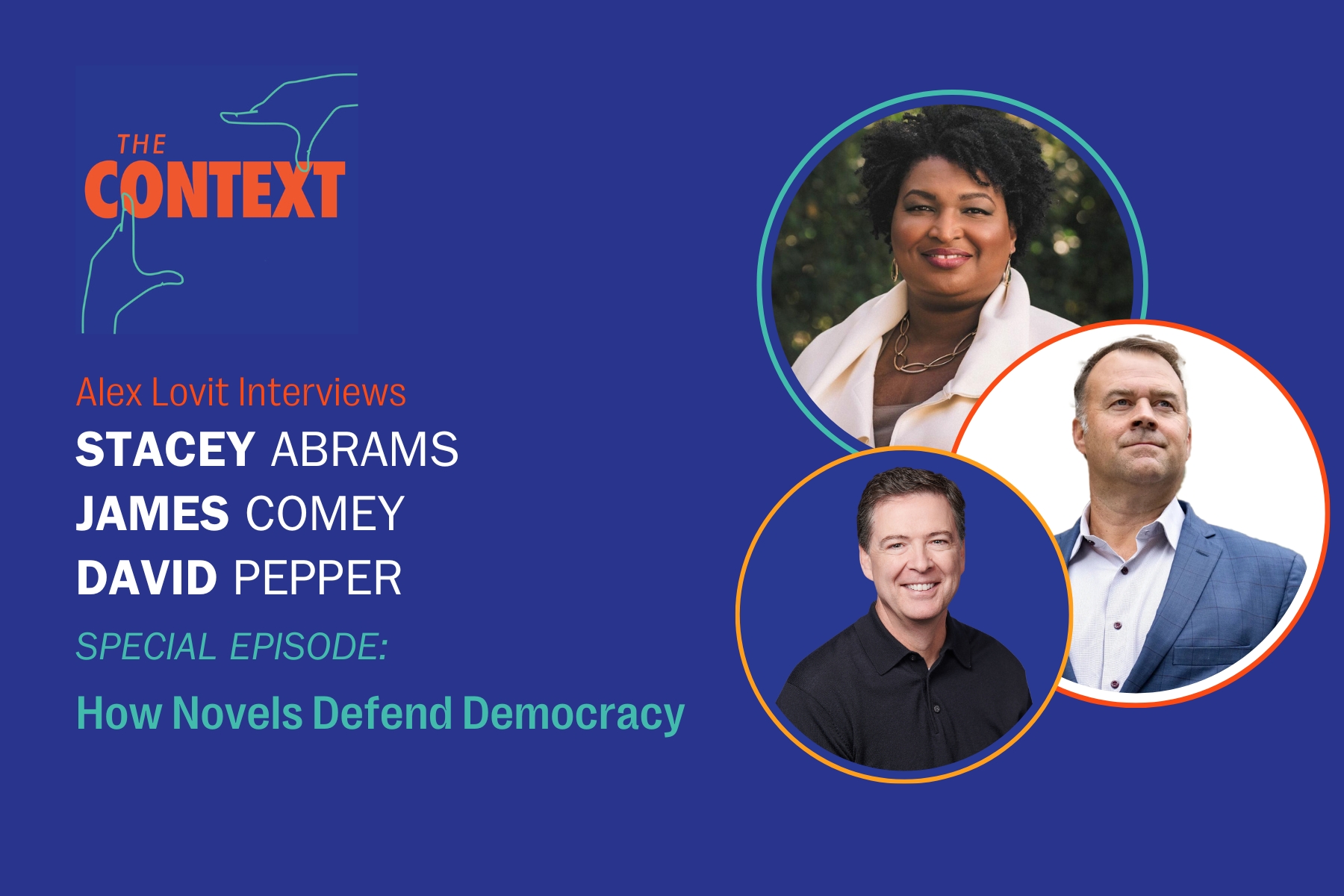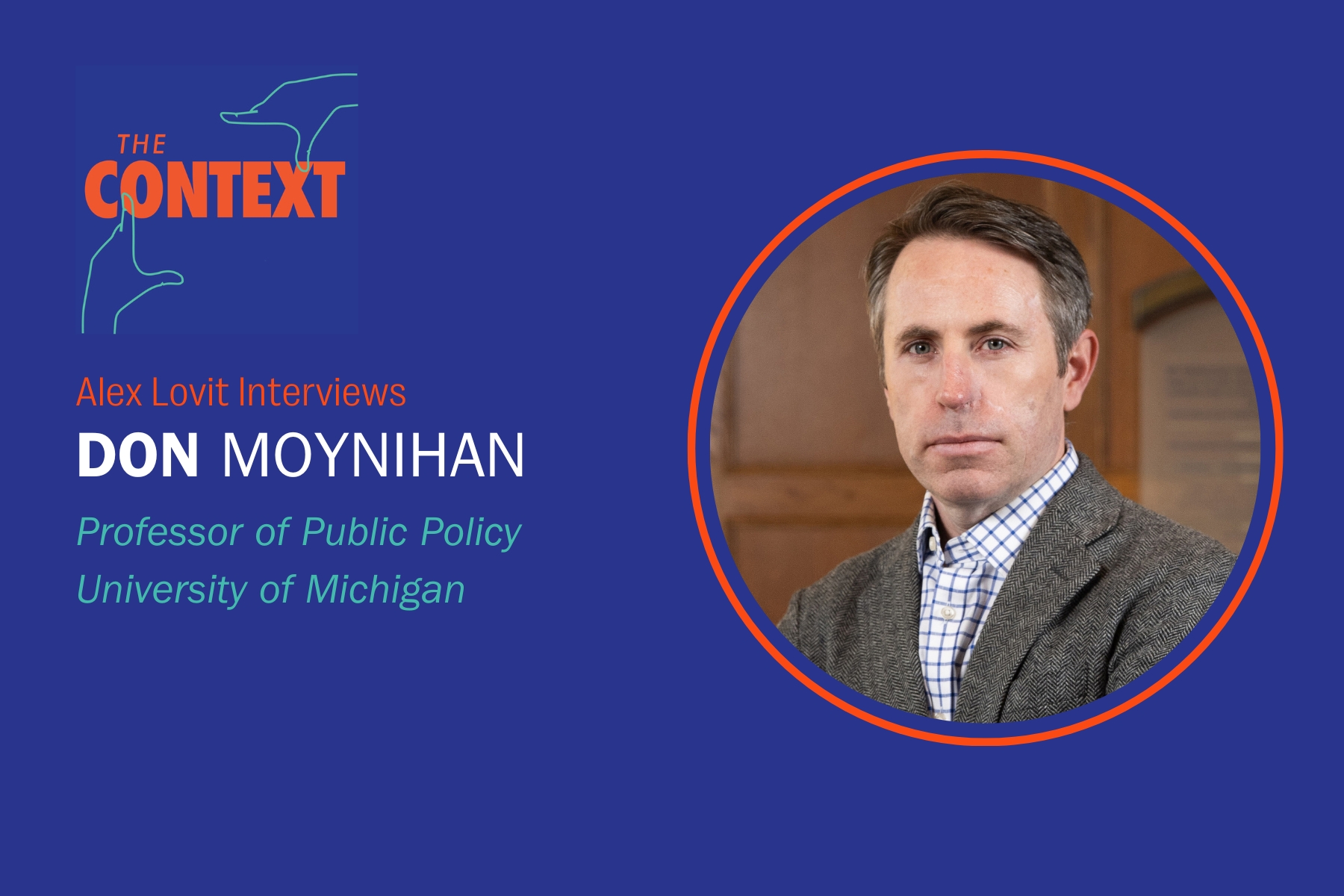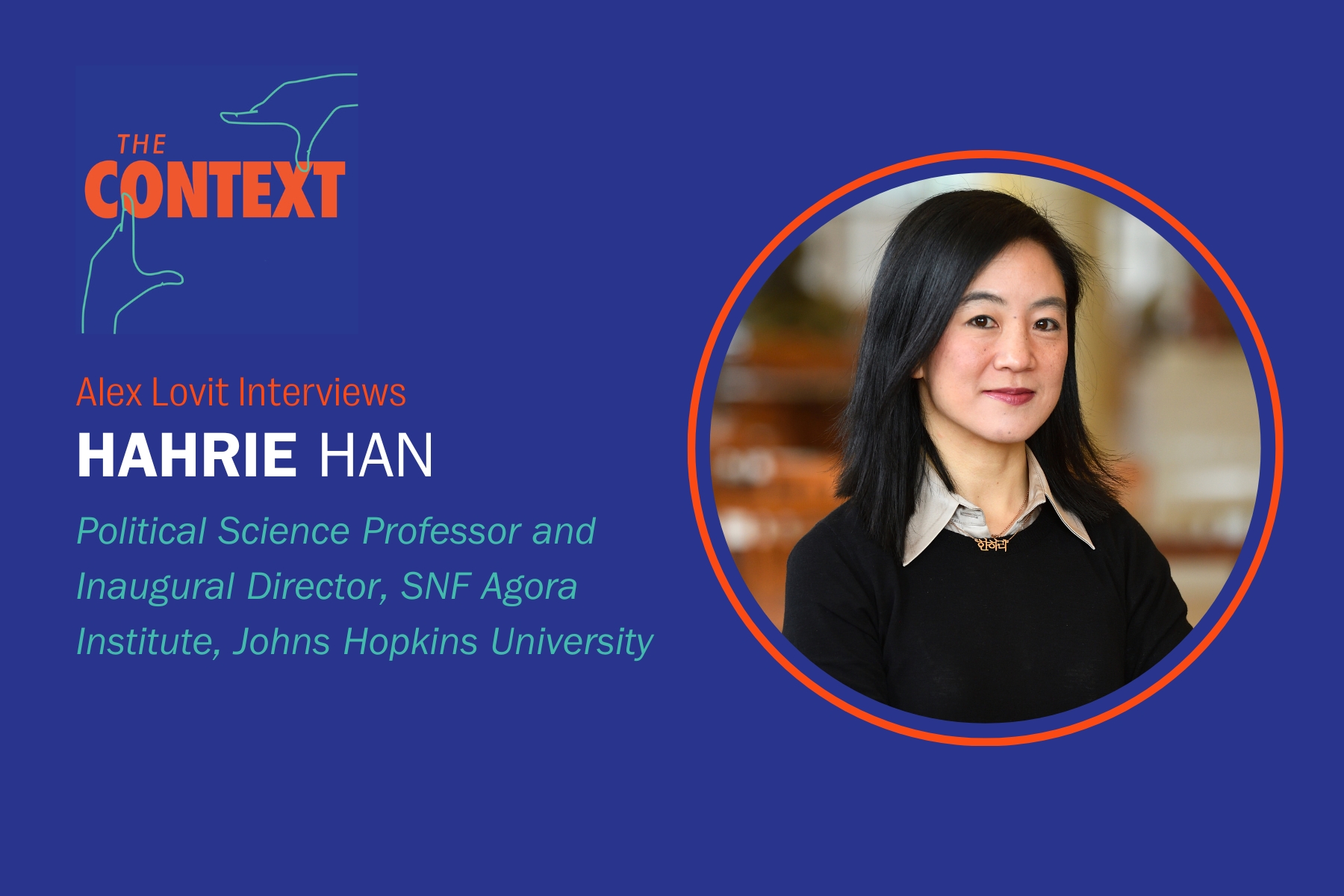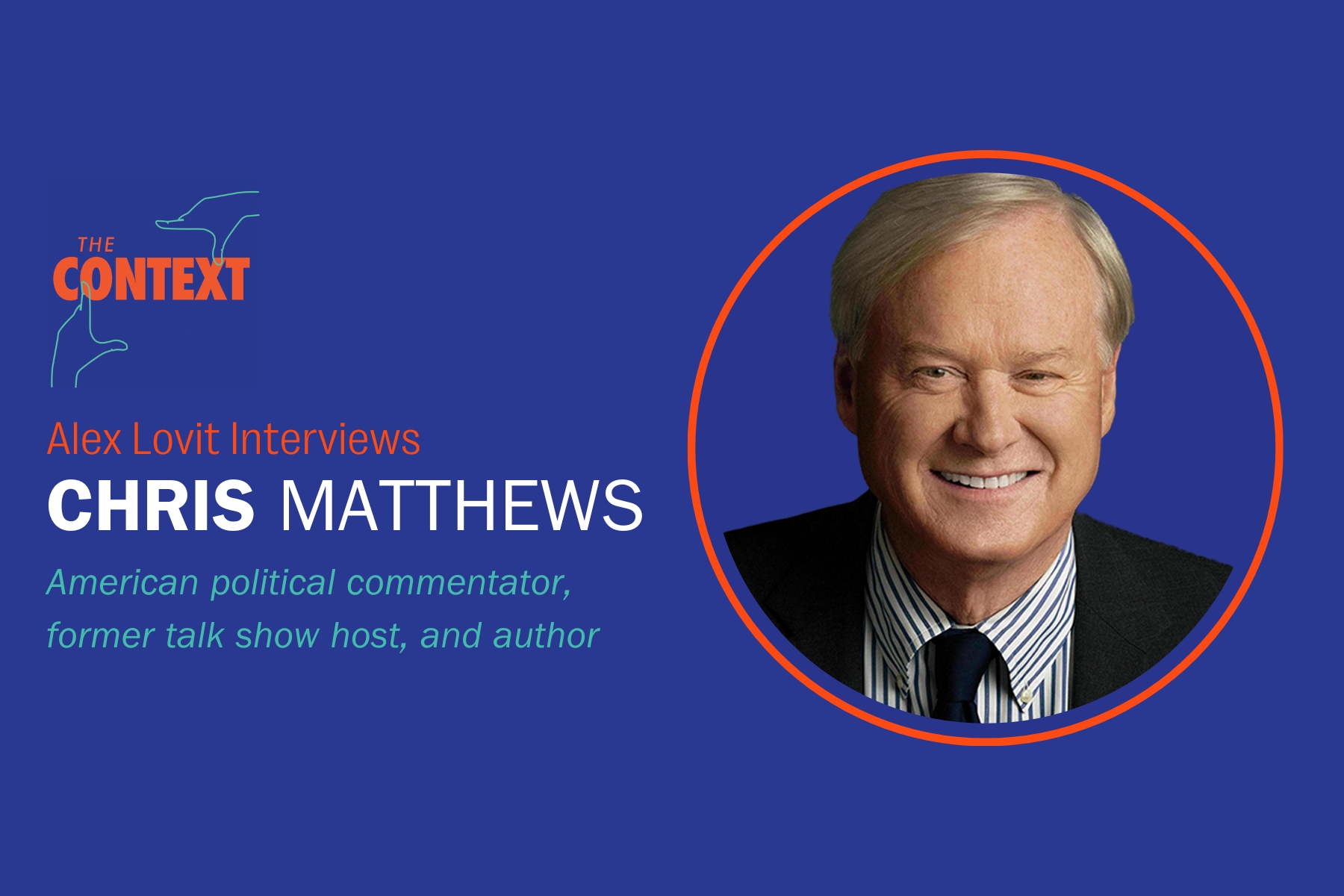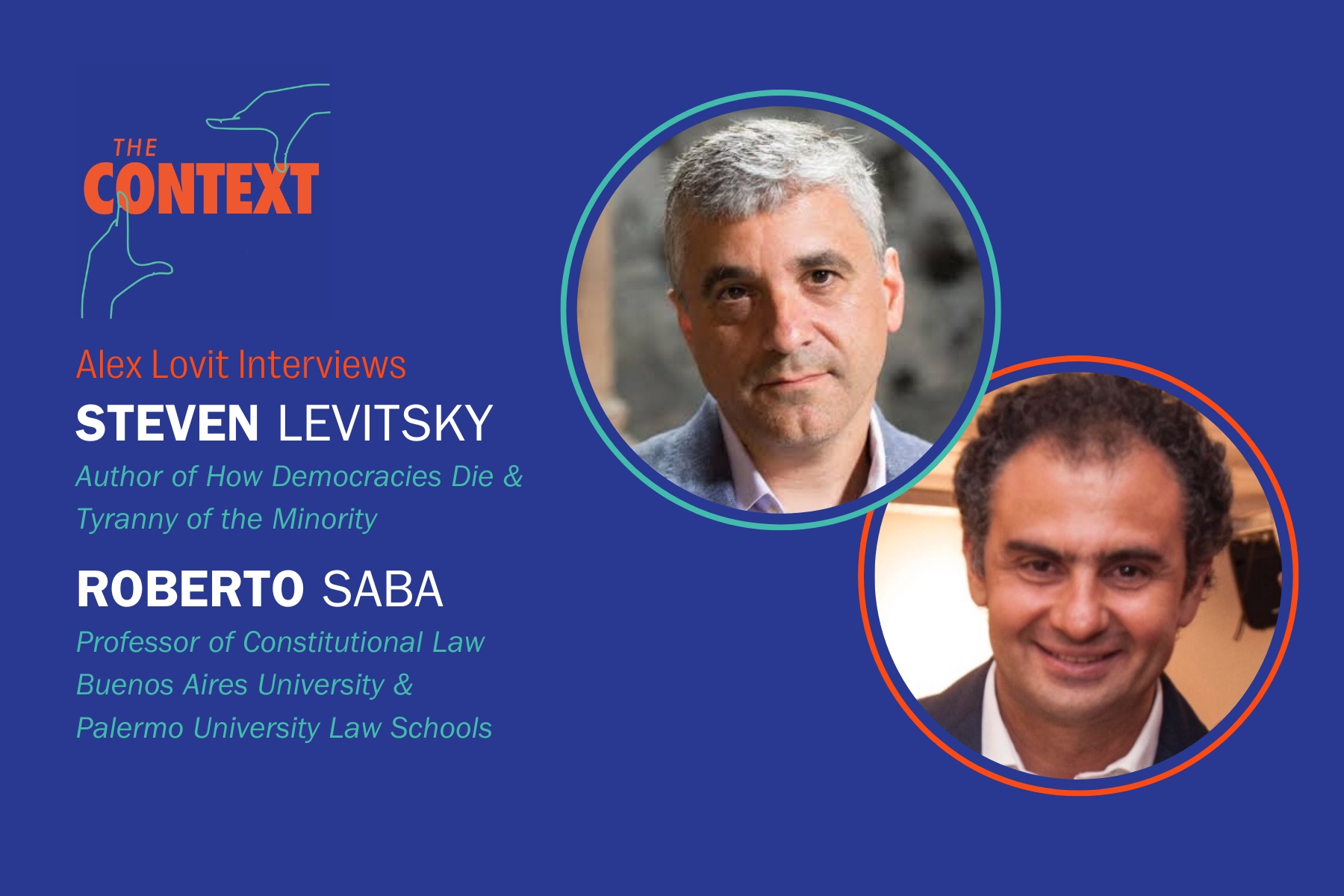What’s Democratic about Giving Tax Dollars to Private Schools?
Public schools are essential for democracy—and they’re under attack. But the very policies that are being championed as their salvation may have a catastrophic impact on American education for generations. Public education advocate and historian Diane Ravitch unpacks how school choice policies like vouchers and charter schools are dangerous for democracy.
Diane Ravitch is a former assistant secretary in the United States Department of Education. She is the author of several books on the history and policy of American public schools. Her memoir, about her life as a leading public education reformer, will be published this fall. It’s called An Education: How I Changed My Mind About Almost Everything.
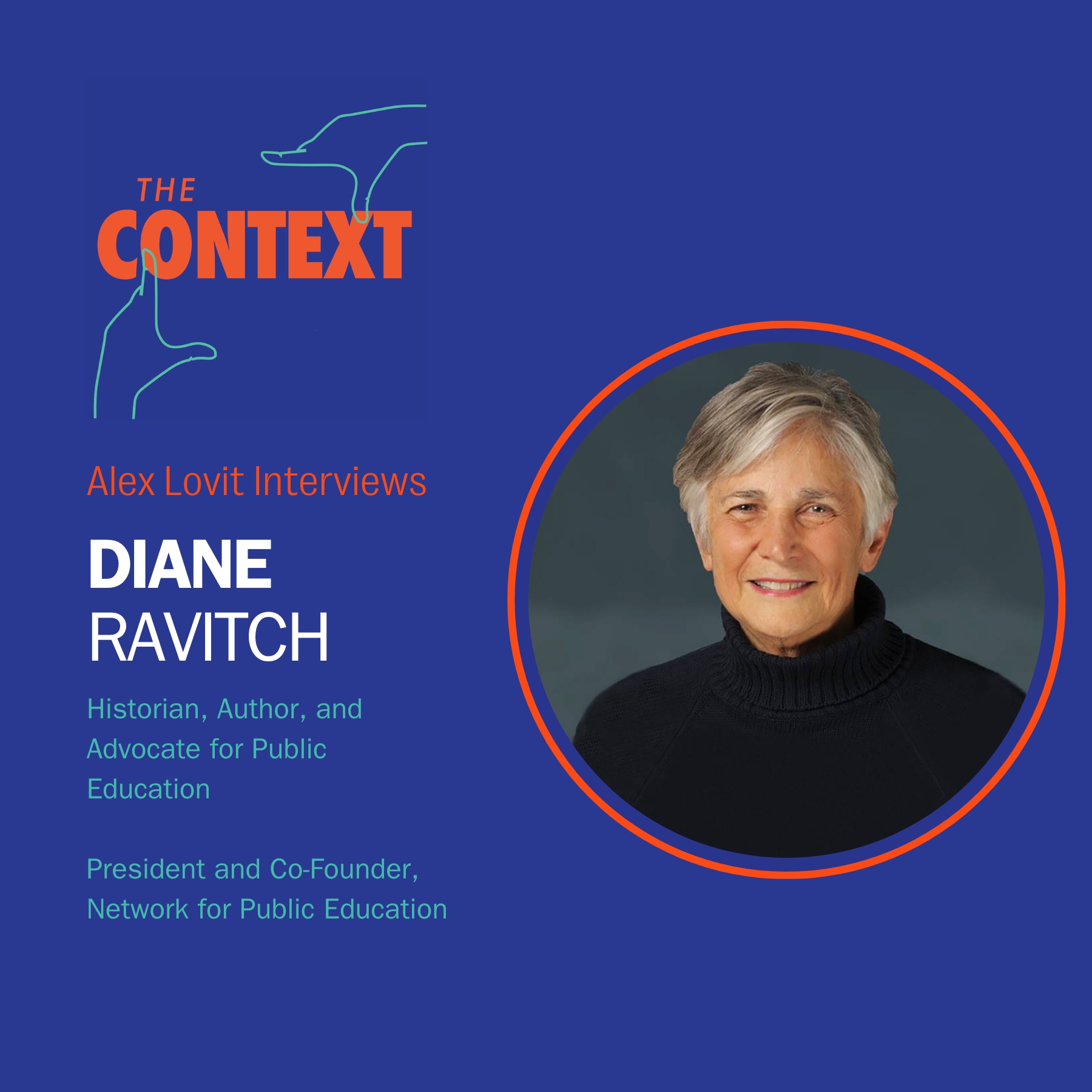
Share Episode
What’s Democratic about Giving Tax Dollars to Private Schools?
Public schools are essential for democracy—and they’re under attack. But the very policies that are being championed as their salvation may have a catastrophic impact on American education for generations. Public education advocate and historian Diane Ravitch unpacks how school choice policies like vouchers and charter schools are dangerous for democracy.
Diane Ravitch is a former assistant secretary in the United States Department of Education. She is the author of several books on the history and policy of American public schools. Her memoir, about her life as a leading public education reformer, will be published this fall. It’s called An Education: How I Changed My Mind About Almost Everything.

Share Episode
What’s Democratic about Giving Tax Dollars to Private Schools?
Listen & Subscribe
Public schools are essential for democracy—and they’re under attack. But the very policies that are being championed as their salvation may have a catastrophic impact on American education for generations. Public education advocate and historian Diane Ravitch unpacks how school choice policies like vouchers and charter schools are dangerous for democracy.
Diane Ravitch is a former assistant secretary in the United States Department of Education. She is the author of several books on the history and policy of American public schools. Her memoir, about her life as a leading public education reformer, will be published this fall. It’s called An Education: How I Changed My Mind About Almost Everything.
Alex Lovit: Public education has been an essential ingredient in American democracy since its earliest days. And just like our democracy has never been perfect, neither have our public schools. But for centuries, Americans have had faith in the basic idea that public schools serve the common good. My guest today says that that idea is now under attack, even though the policies undermining our public schools are presented as if they’re going to fix them.
You’re listening to The Context. It’s a show from the Charles F. Kettering Foundation about how to get democracy to work for everyone and why that’s so hard to do. I’m your host, Alex Lovit. Today I’m speaking with Diane Ravitch. She’s an outspoken historian and champion of public education. She served as Assistant Secretary in the U.S. Department of Education under George H. W. Bush. And her memoir about her life as a leading thinker about public education issues will be published this fall.
Diane Ravitch, welcome to The Context.
Diane Ravitch: My pleasure. Thank you for inviting me.
Alex Lovit: So I thought we’d just start with what’s happening in Federal education policy right now. And the biggest thing happening is that President Trump has fired about half of the workforce of the Federal Department of Education. He has said he’d like to eliminate the Department altogether. Just help us understand that this means. What does the Department of Education do?
Diane Ravitch: Well, I think he and the new Secretary have a misunderstanding about what the Department does. They think that it’s supposed to raise test scores, and that’s never been part of the mission of the Department. Its mission–since it was created back in 1979 by President Carter, its mission has been equity, meaning to say that it’s about redistributing funding and also protecting the civil rights of students.
There’s never been real equity, that is, enough money for them to be equal to wealthy schools. But they’ve certainly relied on Title I funding, which is funding for the low-income schools, and also the funding for students with disabilities, which is called IDEA, the Individuals with Disabilities Education Act. What Trump and his Secretary have promised to do is to turn that funding over to the states for vouchers for homeschooling, and it would not benefit students of low income or students with disabilities. It would benefit whoever wanted vouchers or charters or homeschooling.
Alex Lovit: How do you understand where this idea of closing the Department of Education is coming from? Who’s pushing it? What are they trying to accomplish?
Diane Ravitch: Well, I think in the case of Mr. Trump, he has a misunderstanding about the Department. He somehow thinks that the Department is deep into indoctrinating American students, which is ridiculous because the Department actually is forbidden from interfering. No Federal official may interfere with the curriculum or the program of instruction in any public school in America. That’s been a matter of law since 1970.
But he’s under the impression that teaching about gender and racism is somehow emanating from the Department of Education and that he can get rid of this if he gets rid of the Department. But he sees it as somehow the essence of evil, and it’s really just a funding distribution instrumentality, and it doesn’t indoctrinate anybody. But he fundamentally doesn’t know what it does. And for that matter, I don’t think that the new Secretary, Linda McMahon, understands it either.
Alex Lovit: There has been a movement to close the Department of Education for many years now, predating Trump. Can you talk a little bit about the history of that idea?
Diane Ravitch: Well, the Department of Education goes back to 1867, and its origins were simply to collect data about how many kids were in school, how many graduated, how many schools there were. And it never had any role in telling schools what to do until the Brown vs. Board decision. But in 1964-65, it became very active in terms of enforcing the Supreme Court decision to eliminate school segregation. And in 1965, Lyndon B. Johnson was able to get through Congress the first substantial funding for American schools.
And the purpose of the funding was not to raise test scores but rather to make sure that there was not complete equity but at least more funding for the poorest schools, most of which were in the South. And so the South essentially, after 1965, its public schools became more desegregated than schools in the rest of the country because the Department said, “Well, now that we have money, we’re not going to give it to you unless you agree to abide by the dictates of the Supreme Court.”
Alex Lovit: So the way you’ve just told the story of the history of the Department of Education is a story largely about desegregation and trying to enforce Brown vs. Board. So does the attempt to remove that Federal role in education date back to that same pro segregation movement?
Diane Ravitch: Well, the choice movement is firmly embedded in the resistance to segregation. There was no agitation for school choice until the Brown decision came out in 1954, saying that segregated schools were unconstitutional. And the response in itself was, we’re just not going to comply. And so many of the southern states opened up private schools and funded them from the state treasury, and they were segregation academies.
And several of the states in the South attempted to pass legislation saying, well, why should we give the parents the money that they paid in taxes, and they can go to private schools? But the purpose behind the segregation academies, which is kind of the forerunner of charter schools, the purpose of it was to avoid desegregation.
Alex Lovit: So you’re obviously not a fan of Trump’s education policy and this idea of closing the Department of Education. But you’ve actually been critical of the last several administrations’ education policies. So you criticized George W. Bush’s No Child Left Behind, Barack Obama’s Race to the Top. And if I understand correctly, your argument is that the Federal Department of Education was sort of abusing its power a little bit to enforce mandates on the entire nation. Do I have that right?
Diane Ravitch: Yeah, that’s correct. George W. Bush was the first to say that there should be a much more activist role in education that reached K through 12 schools. And I was initially a supporter of No Child Left Behind because I was a believer in the idea that if there were standards, if there were tests, if there was accountability, if schools were singled out for their rising test scores and punished for their dropping test scores, this would somehow lead to higher test scores.
That legislation turned out to be a disaster because it got schools across the country focused only on standardized testing and by the wayside went everything that wasn’t tested-civics, history, science, recess, the arts. Those all, which used to be part of a good public education, became far less important than the things that were tested, which was reading and mathematics.
And so George W. Bush pushed No Child Left Behind, which was purely what I call a test-and-punish regime. But like I said, I supported it initially, and it wasn’t until about 2007-2008 that I began to look again and say, this is ridiculous because No Child Left Behind says that if you’re not on track to have 100 percent of your students proficient in reading and math, your school will be subject to drastic punishments. You might have your entire staff fired. The school might be turned over to private management. It might be closed completely and everyone would be fired.
So there were all of these terrible punishments for principals, teachers, and schools, all tied to standardized tests and all tied to a completely ridiculous and unachievable goal. There’s no nation in the world where 100 percent of the children are at proficiency. So No Child Left Behind, in my view, was a disaster. I called it the death [spiral] of American education. The main effect that it had was to turn schooling into this grind of tests and tests and tests where–what I learned about testing over the years was the rich kids get the highest scores, with exceptions here and there; the poor kids get the low scores.
And that doesn’t change. It’s true of all standardized testing. So then we come to Obama, and I had high hopes that Obama would somehow reverse this punitive approach to education. But instead, Arne Duncan and his team, mostly consultants from the Gates Foundation, the Broad Foundation and others, came up with this idea of Race to the Top. And Race to the Top was what I–again, I’ve called it No Child Left Behind on steroids because the punishments were ratcheted up, and focus again was the tests–the tests in reading and math.
And they took it down to the level of not just the school but individual teacher. And so teachers had to produce test scores that showed that their scores went up and, if they didn’t, they were considered bad teachers. That had an incredibly demoralizing effect on teachers because the teachers who were teaching in the kind of well-to-do suburban schools were always able to generate higher scores, or usually able to. And the teachers who were teaching poor kids and kids with disabilities and kids who didn’t speak English generated low test scores.
And they were bad teachers. They may have been terrific teachers. But it was a long period of time, eight years, of Race to the Top and, again, this grinding pressure to raise test scores. And that ultimately failed. It did not raise test scores. But what Arne Duncan and the Obama administration also did was to introduce something called Common Core Standards. And again, Common Core Standards came with a high promise, just as No Child Left Behind and Race to the Top did. We’re going to raise everybody in sports. We’re going to be first in the world.
And ten years after the Common Core Standards were introduced, along with tests that went with them and textbooks that went with them, the scores were unchanged. And they were supposed to close the gap between low performing and high performing, and they didn’t. They were supposed to raise scores, and they didn’t. And then came COVID, and somehow the whole conversation changed. It just became what school is open and what school is closed. But we still have on the books No Child Left Behind.
Alex Lovit: Well, so I have a couple of questions about this. One is just the previous republican President had a major education policy initiative, No Child Left Behind, and then continuity with the incoming democratic administration of Obama. But then what Trump is doing seems like a very severe policy shift, going from the Federal government having a very overweening role in education oversight to saying we’re going to get out of the business of Federal education oversight altogether. How do you understand that policy shift?
Diane Ravitch: It’s just a continuation of what Trump wanted to do in his first term but was unable to get his choice legislation through. But he’s been consistent in that the people he listens to–and in the first term it was Betsy DeVos; now it’s the America First Policy Institute, which was headed by Linda McMahon–they think that the public schools are somehow deeply evil, that they’re responsible for teaching unamerican ideas, that they focus too much on racism, on gender ideology.
And so the way to get rid of all of that teaching about things that they don’t want kids to know is to get rid of the Department of Education. So they’re going in a direction of school choice is everything. The irony is, we now have a lot of evidence that school choice does not raise test scores and that it probably will lower them. And we’re heading into something like a dumpster fire in terms of what happens to public education, which is where about 85 percent of American schoolchildren are.
And more states will have more money for vouchers. And what we know about vouchers is that the more widespread they are, the less effectiveness they have. Most of the kids in every state with vouchers already are in private school. So what vouchers do, and what he wants to do more of, is to underwrite the tuition of kids already in private school and underwrite the tuition of kids who already are attending religious schools.
The rhetoric is that vouchers and choice will somehow save poor kids from failing public schools. And we now know that that’s actually false because we’ve been trying it now for 30 years. Vouchers have been in place in Milwaukee for 30 years. They’ve been in place in Cleveland for almost 30 years. And now we have states that have had vouchers for 20-25 years, and they’re all performing at about the same level as places that don’t have that much choice.
So choice is not really an answer to any question other than how do we take money away from public schools and hand it over for private decision making.
Alex Lovit: Thinking about the voucher movement and the privatization of public education, so you’re saying that Trump is going down this road by attempting to abolish the Department of Education. I’ve also heard the argument that George W. Bush and Barack Obama kind of promoted privatization by holding, as you said earlier, holding schools to unrealistic standards and, in some ways, promoting charter schools as an alternative. Are these both examples of privatization impulses?
Diane Ravitch: Yes. I think they are. And when I began writing about this, which was in my 2010 book–so it’s been 15 years that I’ve basically been saying we’re headed towards more vouchers, I believed very early on that charters were a step towards vouchers because it changed the very idea of what public education is about. Public education is a community responsibility. It’s like you pay for a police department, even if you don’t need the police. You pay for a fire department even if you never have a fire. And you pay for the schools because it’s good for society.
And what they were doing with the language of charter schools and then vouchers was saying that education is a consumer choice. I remember Jeb Bush at the 2012 Republican Convention talking about going into a grocery store and having a large selection of different kinds of milk. You could have 4 percent, 2 percent, 1 percent, no percent, chocolate milk, buttermilk, soy milk, almond milk, on and on. And he said, why shouldn’t it be the same with schools?
And I remember Betsy DeVos making the same argument. But that takes away the responsibility of the community to support education because if a family doesn’t have children, why should they support somebody else’s choice? Why should they pay for children to go to a school that their own child would not be accepted in? Voucher schools can discriminate on any grounds. They are not subject to the Federal Antidiscrimination legislation.
They can exclude students with disabilities. They can exclude students whose parents are gay or who are gay themselves. They can say, “We only take people from our particular religion.” And that’s where a lot of the support for vouchers is coming from, people who want to pay for a religious education and want to be subsidized by the state. And we lose is, first of all, a sense of community responsibility. I don’t want to be responsible for paying tuition at a school where my children or grandchildren will not be accepted. I will not vote for a bond issue that will pay for new facilities for a school that excludes kids based on their race, religion, or any other criteria.
But that’s where we are now, and that’s where we’re heading. So we’re heading in a direction that’s profoundly threatening to the democratic purposes of public education. And it will make states responsible for the tuition of every single child in a private school. Now what that means is not only are working-class people subsidizing the tuition of rich people, but it also means the elimination of separation between church and state.
So when people in the Trump camp say that they want to go back to the way things were, this is not the way things were. We have had a very strong tradition of separation, that we have the First Amendment that says there’ll be no religious discrimination. You can practice whatever religion you wish or none at all, but also there’ll be no state establishment of religion, which the Supreme Court over many, many generations has interpreted to mean that the state does not pay for the tuition at private religious schools.
So we’re actually introducing a new idea, which is the state is responsible for everybody’s tuition, regardless of what school they go to, and even if they homeschool. In the past, homeschoolers paid their own expenses. Now their expenses will be paid by the state. And obviously, there’s not an unlimited amount of money for education. So states will be funding a religious school system, private school choices, a charter school system, and the public schools will not only get the leftovers, they will have the kids that nobody else wants, who are more expensive to educate.
Alex Lovit: You’re an historian of public education. When did we form public schools, and how did we think about those schools?
Diane Ravitch: Public schools were created with the idea that the community had to get together and provide a school for their children. And kids would come from all different walks of life, rich and poor and middle class. And one of the boasts was that the banker’s son would sit next to the farmer’s son, and they would learn together. This would be very good as a way of creating a common identity as Americans. The Founding Fathers had it as a matter of principle that every town and every city should have publicly supported public schools.
And John Adams very famously said that there should not be one square mile in this country where people were inhabitants that didn’t have a public school that was paid for by the taxpayers and not by a charitable institution. So the Founders did have this idea of public education, even though they didn’t start it. They believed that the states would start it, and the states did start it. And the public school movement–they called it the Common School Movement–was very powerful.
Now were they open to all? No. They were in many places segregated by race and, in some places there were boys’ schools and girls’ schools. But the principle of the public is responsible for supporting public education was well established by the early 19th century.
Alex Lovit: So you said that Trump has a mistaken belief that the Department of Education is setting curriculum nationwide and, in his view, is creating woke curriculum, and that’s part of his motivation for squashing it. Culture wars have always played out in the classroom. Can you talk a little bit about who is making those decisions about curriculum, and what are the democratic inputs into those decisions?
Diane Ravitch: The major decision-making for curriculum is made by state legislatures. And they’re passing laws all the time about what may be taught and should not be taught in the classroom. So if a culture war is raging about, say, critical race theory, there’ll be states that will pass laws saying no more teaching of critical race theory, although the irony is I suspect that most of the people passing those laws have no idea what critical race theory is and, if asked, couldn’t define it.
I think that what the Trump people and the people around him had in mind when they began the attack on critical race theory was to create a culture war, which they did very successfully, and lead people to believe that somehow white people were being injured by too much teaching about racism. And if we could get the teaching about racism out of the classroom, this would be good for white children because they would not have to feel ashamed about slavery.
Now nobody alive today was a participant in making decisions about slavery. But it was a shameful period in our history, and it’s impossible to imagine teaching American history and not teaching about the horrors of human slavery and how we got rid of it and all the ways in which there’s a legacy that remains with us of racism. And I think that based on the statements that have come from the White House, they don’t want children to know that slavery had a legacy.
It’s okay to say that there was slavery, but they want teachers to teach that, once it was over, it was all over. But then how do you teach about Jim Crow? I mean, that’s a very important part of our history was the period from the end of the Civil War up until the Brown decision, and then beyond the Brown decision. I don’t know how you can teach history honestly and not talk about what happened during those crucial years, those crucial decades.
But they would like to have his–taught some kind of fairy tale about our country in which everybody feels good about everything. I have to say, I think I had that kind of education. I went to public schools in Texas. And when slavery was over, then everybody was free. But now I know a lot more. I know that wasn’t true. I know that wage peonage–and there was a form of near slavery that kept poor blacks poor and trapped and unable to vote and so forth. And I think it’s important to know those things because they happened.
Alex Lovit: So we’re talking here about how history is taught as a major culture war issue. There are others, trans rights in schools, for example. But if these decisions are mostly being made on the state level, are we at risk of becoming a kind of splintered nation where what students learn in Tennessee is very different from what they learn in Massachusetts?
Diane Ravitch: Well, I think so. And in a way, you could say it’s been true for a long time because there was a long period of time when textbook companies had two different sets of textbooks. They would produce a textbook strictly for the South, which [pitified] the events of slavery, didn’t talk about how brutal it was, didn’t talk about the [slaverables]. And that was one form of history that was for the South only. And then they had the textbooks written for the North where students learned a different history.
It’s hard to imagine this kind of division persisting because textbooks are not our only source of knowledge. But I think it all comes down to this feeling on the part of the Trump folks that kids are so sensitive that they have to be shielded from reality. That doesn’t work.
Alex Lovit: You earlier were talking about the inequality in public education in the United States where wealthier communities tend to have successful schools, poorer communities tend to have less successful schools. Do we have to fix poverty before we can fix education?
Diane Ravitch: Well, it may be controversial to say so, but I would say yes. If we care about improved outcomes, meaning higher test scores, better prepared students, then we have to be very concerned about poverty. We have far too much child poverty in this country. We have more child poverty than other nations do that are advanced nations. And I would compare us to European nations, some of the Asians nations, but particularly the Scandinavian nations where they don’t have 15 to 20 percent of the kids living in poverty.
And so when I speak about poverty, what I’m talking about in particular is kids who don’t get medical care. That has a huge impact on students’ performance in school. If they need eyeglasses, they can’t see what’s up on the screen in front of them, and that’s going to impact their performance. If they never have a hearing test, that’s going to impact their performance. If they don’t have adequate nutrition at home because their parents can’t afford it, if they’re moving constantly because their parents can’t afford the rent and don’t have a decent roof over their heads, that affects their performance.
These kids don’t start at the same place, and they don’t end at the same place.
Alex Lovit: So it sounds like you’re saying that education issues can’t be solved by education policy alone, that other social policy–other programs are important to make sure that kids are enabled to learn.
Diane Ravitch: Absolutely. If we were to have a social policy, which we clearly will not have for the next almost four years, we would be attending to the tremendous inequities in American life. And I know right now the word equity is like a forbidden word, but we do have tremendous inequalities and equities. And if you have dramatic social inequality, there will be inequality in the schools. And desperate poverty is very bad for academic achievement.
Alex Lovit: Earlier, you were talking about the various levels of government, where we have national government, state government, local governments, all with kind of overlapping responsibilities. And all those levels of government are democratically elected. So how do you think about how democracy works in this system? How do we decide who has democratic legitimacy when these various levels of government disagree about education policy?
Diane Ravitch: Well, I think one of the things that many people find troublesome about charter schools and also vouchers is they’re not subject to democratic control. I would say right now we’re in a terrible mess. The interest in democracy involves, in my view, having schools that are open to everyone who walks through the door. We’re a community school. We belong to the community. And the community decides what we’re going to do.
This is buttressed and it becomes more democratic by national laws that prevent discrimination so that if you left it solely to the local community, they might say, well, we’ve decided we want to have racially segregated schools again. We had an election, and that’s what most parents want, so we’re going to have segregation. No, because the Supreme Court has said you can’t do that. And so the Department of Education has this Office for Civil Rights that will come in and investigate claims that children are being discriminated against.
If you have public schools that say, sorry, but we can’t accept your child because your child has a disability that we can’t–we don’t have the ability to handle it, the Department of Education Office for Civil Rights would come in and say, “I’m sorry, but the money is there. You have a responsibility.” They cannot say that to voucher schools, nor do they say it to charter schools. There are charter schools that accept students with disabilities, but they don’t have to accept the most severe disabilities. Public schools do as part of their responsibility.
So the interplay in public education is certain things are national, and those are basically civil rights, and state standards or state curriculum because you don’t want to have kids in one city taking state history in fourth grade and then move to another town and they’re taking state history again the next year. So the state kind of says, all right, here’s our state curriculum. We’re not going to tell you how to teach it, but these are the general outlines.
And then the local community makes decisions that affect [herself] and local policies. It’s a complicated system, more complicated than it needs to be, but it’s worked pretty well. And what we have seen all during George W. Bush and then Obama and then Trump–not so much with Biden; I would exclude him–what we have seen through all this period is a campaign against public schools. And this goes back to 1983 when there was a report during the Reagan administration called A Nation at Risk, and that report said our schools are terrible, we’re failing, the schools are bad.
And we have had that echoed again and again, and it’s simply not true. And I know very well one of the people who was one of the writers of the report, and he said they had quite an internal battle about the language because, initially, it was supposed to be a positive report, and there were a couple of the Commission members who wanted it to say our schools are in crisis. Well, our schools were not in crisis then, but they certainly are in crisis now.
Alex Lovit: Who is served by this narrative? So if there’s this narrative that, since 1983, our schools are failing, this is an emergency, we need to privatize, we need more accountability, who benefits from that?
Diane Ravitch: Well, republicans have jumped on that narrative, and I was very involved with different think tanks that were promoting that narrative. You know, I’ve been through a kind of famous change of heart, which I wrote about in my book that’s coming out later this year, where I had been echoing this, “Oh, our schools are failing; we’ve got to do something.” And who does it benefit? It benefits people who are offering alternatives to public schools. It has led state legislatures to become more active in telling public schools what to do, what to teach, how to teach.
There are states now that have legislation saying, this is what you may teach; this is what you may not teach. Recently, they’ve gotten wrapped up in something called the Science of Reading, and they’re saying you may not teach anything other than the Science of Reading. No one’s quite sure exactly what the Science of Reading is, but legislators are.
And I find myself very downhearted about the idea that legislators know more than teachers. They don’t. They should do what legislators do best, but they shouldn’t tell policemen how to do their job. They shouldn’t tell firemen how to put out fires. And they shouldn’t tell teachers how to teach. But they have gotten into doing that because of this repeated rant that our schools are failing. Our schools are not failing.
Our schools have become more and more inclusive. And the more inclusive they are, the harder it is to produce high test scores because the kids with the greatest problems have the lowest scores. And if you accept all kids, you’re going to have kids who will always be in the bottom half of the Bell Curve. I mean, that’s the other kind of irony–the standardized tests are scored on a Bell Curve, and the general public doesn’t understand the Bell Curve, by definition, has a bottom half.
So they say, oops, half the kids are not at average. Sorry, but you’ll never have everybody above average.
Alex Lovit: You’re talking there about as the schools become more inclusive, it’s more difficult to bolster test scores. Is that exacerbated by the charter movement, the privatization voucher movement? Can you talk a little bit about that?
Diane Ravitch: Well, public schools are required to accept everybody. Not in every school, but they must be responsible for every child, regardless of their disability or regardless of what issues they may have. They may be impossible kids. They don’t want to learn. They don’t do their homework. But they have to be enrolled in school. Charter schools don’t have to keep them. They don’t have to accept them. Voucher schools don’t have to accept the kids they don’t want.
So as we move further and deeper into his privatization movement, we will see the voucher schools [getting off] the kids they want, the charter schools getting off the kids they want, pushing out the kids they don’t want, and the public schools becoming a dumping ground for the kids that were not accepted in either of the other. The saving grace for public schools has been that many communities actually like their public schools. And so the kids have not flocked to either vouchers or charters.
I was in Los Angeles recently and, over the years as I’ve visited there, school board members tell me that 80 percent of the charter schools there have vacancies. They have vacancies because apparently there are people who actually like their local public school, like the teachers. And the teachers, by the way, are usually far better qualified in public schools than they are in either charter schools or voucher schools.
Voucher schools don’t have to have any requirements for their teachers or their principals. Charter schools in some states, like North Carolina, half their teachers need to be certified but only half. In public schools, all the teachers are certified. So I would say to a parent, if you’re choosing a school, look at the public school first because all the teachers are certified, and your child’s rights will be guaranteed as long as the Trump administration doesn’t roll them back.
Alex Lovit: We’ve been talking a lot about democracy and how various levels of democratic government are overseeing schools. I’d like to ask about what schools do for democracy, the purpose of public schools in a democracy.
Diane Ravitch: It’s a very important question: What do schools do for democracy? The schools are a place where kids come together from all different backgrounds. And even in schools where it’s heavily concentrated of one race, there’s still a tremendous variety of kids. They come from different kinds of homes, different religious backgrounds, different ethnicities, and they learn to live together. That’s so crucial. And the direction we’re heading now is to sort people out, families and children, by their religion, by their economics, by their race.
And this is the direction of vouchers and charters, to have kids coming from the same background. That’s very antithetical to democracy. It’s antithetical to the original purpose of public schools, which was to develop a common culture, one in which we were all participants. And we’re moving towards more segregation, not less. And segregation is not good for democracy. In order to have a democracy, you have to have what I would call a sense of a common good. The common good means that if I help you, I’m not doing it for myself. I’m going it because helping you is good for all of us.
So the question that I think is at the heart of democracy is, will the citizens have a sense of their responsibility as citizens, or will they just do things for their own family? Will they say, “I’m going to build a moat around my house, and my children will be protected, and my grandchildren will be protected, and we’ll keep everybody else out unless they’re just like us. And the people like us will separate ourselves from the rest of the community. And if they don’t have public services, that’s their problem.”
That’s the direction we’re heading in now. And I think that what public education has done over the generations has been to create the glue that makes the society a caring society. And we’re heading right now in a direction where the only care is for one’s self, and I think that’s very sad. It’s very bad for democracy.
Alex Lovit: Well, and one of my questions, whether people building moats around their houses will in fact achieve the nirvana they’re seeking. A lot depends on society. But I think that’s a good note to end on. Diane Ravitch, thank you for joining me on The Context.
Diane Ravitch: Thank you. It’s been great to talk with you, Alex.
Alex Lovit: The Context is a production of the Charles F. Kettering Foundation. Our producers are George Drake, Jr., and Emily Vaughn. Melinda Gilmore is our Director of Communications. The rest of our team includes Jamaal Bell, Tayo Clyburn, Jasmine Olaore, and Darla Minnich. We’ll be back in two weeks with another conversation about democracy.
In the meantime, visit our website, Kettering.org, to learn more about the Foundation or to sign up for our newsletter. If you have comments for the show, you can reach us at TheContext@Kettering.org. If you like the show, leave us a rating or a review wherever you get your podcasts, or just tell a friend about us. I’m Alex Lovit. I’m a Senior Program Officer and historian here at Kettering. Thanks for listening.
The views expressed during this program are critical to us having a productive dialogue, but they do not reflect the views or opinions of the Kettering Foundation. The Foundation’s broadcast and related promotional activity should not be construed as an endorsement of its content. The Foundation hereby disclaims liability to any party for direct, indirect, implied, punitive, special, incidental, or other consequential damages that may arise in connection with this broadcast, which is provided as is and without warranties.
Transcripts are created on a rush deadline by a Kettering Foundation contractor and may contain small errors. The authoritative record is the audio recording.
More Episodes
- Published On: January 14, 2025
The separation of church and state is a foundational principle of American democracy, but that doesn’t mean that religion hasn’t played an...
- Published On: December 17, 2024
“Administrative burdens” is a term for the frictions people experience when interacting with government—learning how a program works, taking the time to...
- Published On: December 3, 2024
In 2015, Crossroads Church, a majority-White evangelical megachurch based in Cincinnati, Ohio, launched a new program to address racial division and racism....
- Published On: November 19, 2024
Donald Trump has been elected the 47th president of the United States. He will enter the White House with his party in...
- Published On: November 5, 2024
Argentina’s constitution is among the oldest democratic constitutions in the world, and in significant respects it was modeled after the constitution of...
